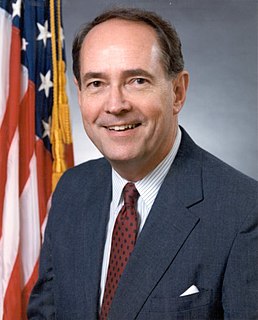A Quote by Asa Hutchinson
Historically, there is a presumption that the legitimate police powers of the states are not to be pre-empted by federal law unless Congress has made that purpose clear.
Quote Topics
Related Quotes
There are people who oppose a federal Constitutional amendment because they think that the law of family should be made by the states. I can see a legitimate argument there. I think it's mistaken, however, because the federal government, through the decisions of life-tenured federal judges, has already taken over that area.
Not surprisingly, the federal judiciary nearly always rules in favor of the federal government. Judicial review, contrary to the assurances of its advocates, has hardly restrained Congress at all. Instead it has progressively stripped the states of their traditional powers, while allowing federal power to grow unchecked.
For states' rights advocates, the Constitution is like a contract that is openly violated by one party with impunity. On paper, the states remain sovereign powers, while in reality the federal government appears able to dictate everything from the ingredients of school lunches to speed limits. Congress now routinely collects taxes in order to return the money to the states with conditions on their conforming to federal demands.
To hold that Congress has general police power would be to hold that it may accomplish objects not intrusted to the general government, and to defeat the operation of the 10th Amendment, declaring that 'the powers not delegated to the United States by the Constitution, nor prohibited by it to the states, are reserved to the states respectively, or to the people.
I see,... and with the deepest affliction, the rapid strides with which the federal branch of our government is advancing towards the usurpation of all the rights reserved to the States, and the consolidation in itself of all powers, foreign and domestic; and that, too, by constructions which, if legitimate, leave no limits to their power... It is but too evident that the three ruling branches of [the Federal government] are in combination to strip their colleagues, the State authorities, of the powers reserved by them, and to exercise themselves all functions foreign and domestic.
To argue that it is unconstitutional for local law enforcement to be a legitimate partner in immigration enforcement is shortsighted. It is evidence of a lack of commitment to securing our borders and a lack of appreciation for the proper role of the states in supporting federal law enforcement priorities.
I consider the foundation of the Constitution as laid on this ground that 'all powers not delegated to the United States, by the Constitution, nor prohibited by it to the states, are reserved to the states or to the people.' To take a single step beyond the boundaries thus specially drawn around the powers of Congress, is to take possession of a boundless field of power not longer susceptible of any definition.
































